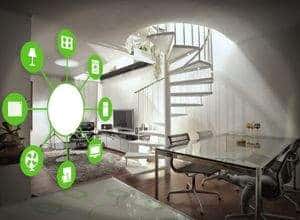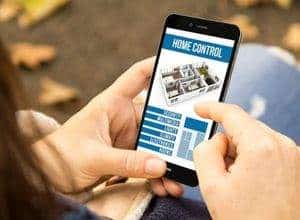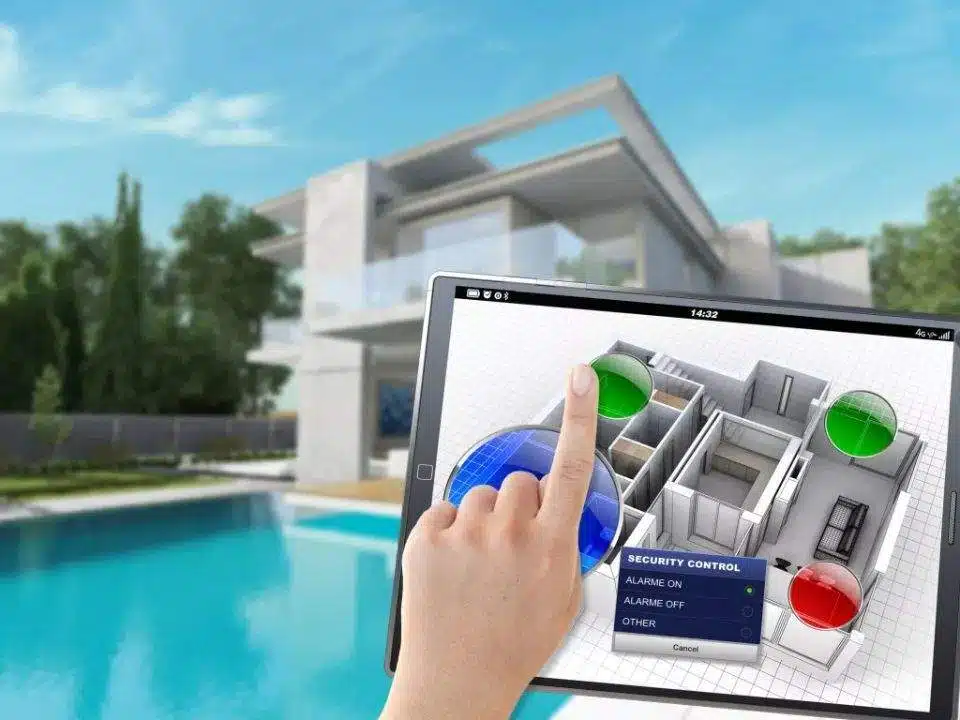When considering new construction home automation, it’s critical to consider your ultimate goals. After all, you’re constructing a house that matches practically everything you could need and want, including amenities that will make life simpler. At the end of the day, you know when to have new construction home automation because it just feels right.
It may require extra planning, but ease, peace of mind, and relaxation rewards are well worth the effort.
What is Smart Home Automation?
Smart home technology, generally, refers to any collection of gadgets, appliances, or systems that link to a shared network and may be operated autonomously and remotely. When your residential technology integrates into a single system, it is referred to as a “connected home.” Your home’s thermostat, lighting, TVs, audio speakers, security cameras, appliances, locks, and other devices, for example, are all linked into one system that could be operated by your smartphone or a mobile touch screen gadget.

New construction home automation enables you to access luxury and high-tech functionality that was unavailable before. As technology innovates and progresses, so will the opportunities for residential home automation to make life fun and easy.
Getting Ready For New Construction Home Automation
There are various factors to consider in the house design to ensure that it is suited for new construction home automation. Here are some things to think about:
Wiring for Neutral
Wiring is the most important concern when prepping a new construction home automation.
To work effectively, most home automation systems need neutral wiring. Most electricians utilize neutral wiring as common practice, but it’s crucial to double-check and ensure that the specifications call for it to be used throughout the whole property. Otherwise, you may have some problematic outlets that may obstruct your new home automation ambitions.
Junction Cases
Extra junction boxes should be installed throughout the house. These support the in-wall switches in your new construction home automation, allowing for future system expansion. If you don’t plan on using the junction box immediately, a simple face plate will conceal it.
It may also be beneficial to consider adding a few deep junction boxes. While basic junction boxes are sufficient for many home automation systems, it never hurts to have choices. Deep boxes provide a broader selection of technologies and make switch panel installation considerably easier.
Conduits for Cable
Most distributed systems need cables that are different from standard electrical wiring. And included are audio-visual cables (video and speaker wires), network cables (the most popular Ethernet), phone lines, and appliance-specific wiring.
These run separate cable conduits from your standard electrical conduits. Having a conduit flowing to each area where you intend to have home automation capability is critical.
These conduits allow hardwired connections across your home network that are significantly faster, more reliable, and secure. Installing them throughout new home building gives this capability without requiring the demolition of walls.
Closet Wiring
Many new construction home automation systems require servers, distribution panels, and other devices. Everything should be kept in a wire closet that is easily accessible and strategically positioned in the home.

The closet should be large enough to contain everything while allowing movement. It will also feature several wiring termination points. This is best implemented during construction; it cannot be added afterward.
Loads Should Be Separated
It is critical to divide your electrical load in two in any smart house. One will manage all your automation technologies, while the other will handle everything else. Because every light, appliance, and automated system needs power, varying the loads can help avoid electrical fires and other issues.
As previously stated, some smart home systems send signals via standard neutral wire. If such a wire is shared by a dishwasher, refrigerator, or laundry equipment, it may cause interference. Planning ahead of time won’t only prepare the house for a home automation system during building but will also make future expansion easier.
Benefits of New Home Automation
To fully appreciate the benefits of a new construction home automation, consider comparing it to a post-construction installation. Most dangers and constraints associated with integrating technology into an existing home may be avoided.
Installation Is Simpler
The most vital benefit of pre-wiring a home automation system is that it greatly simplifies installation. For network appliances that depend on hard wiring, the installation might require the technicians to remove entire sections of walls for a post-construction installation. Aside from being inconvenient, it also takes longer and is more pricey.
Putting that sort of functionality in place during construction, or even simply designing your home to accommodate a system later, results in a much simpler installation process. The technicians could breeze through wiring and conduits already in place.
Increased Performance
A hardwired network enables a much higher transmission speed compared to wireless networks. While a wireless network got its benefits, namely an easier installation post-construction, it wouldn’t have the same reliability and speed as Ethernet cables.
For homes that wish to stream in 4K or plan to have multiple devices operating on the same network – you will want to install a hardwired system wherever possible.
Increased Network Security
Wireless systems are also more likely to be compromised than hardwired ones. The only access point is via a direct physical connection with the network, indicating your network is far more secure.
Because you wouldn’t have to deal with interference from other signals incorporating with those emitted by a wireless router, the system would also be more stable. This suggests the network is less likely to fail while in use, keeping data secure.
Cost Savings
Easy installation + improved security and reliability = cost savings.

Performing the same installation after construction will require much more time, money, and effort than executing it during the building phase. The lower risk might also result in savings in the long run because your system and private information are protected against loss.
The Ability To Adapt To New Appliances And Equipment
Smart home systems are notoriously adaptable when it comes to accommodating new appliances, gadgets, and other technologies. No matter how cutting-edge your appliances appear, newer, more spectacular versions will be produced as time passes. Aside from that, you’ll most likely add to your gadget arsenal as you replace older ones or find new technologies to complement your outdoor and indoor environments. Integrating these newcomers seamlessly would make your job as a homeowner much easier and let you keep upgrading to the latest lifestyle technology.
Maximizing Home Security
When you incorporate surveillance and security features in your new construction home automation, your home security could skyrocket. There are many options here — only a couple dozen are currently being explored. For instance, new construction home automation could connect surveillance cameras, motion detectors, automated door locks, and other tangible security measures throughout your house so you can activate them from one mobile device before bed. You could also opt to receive security alerts on your devices depending on the time an alert goes off and monitor activities in real-time, whether in the house or halfway around the globe.
Improved Appliance Functionality
Smart homes could also help you run your appliances better. A smart TV would help you find better apps and channels for your favorite programming. A smart oven would help you cook your chicken to perfection without thinking about overcooking or undercooking it. A cleverly designed audio system and home theater could make managing your music and movie collection effortless when entertaining guests. Finally, connecting your appliances and other systems with automation technology would improve your appliance effectiveness and generally make your home life much easier and more enjoyable!
Comfort, Convenience, and Ease of Use
A new construction home automation makes it more convenient, whether you are:
- Entertaining guests
- Relaxing after a long day of work
- Just getting around your home
With a smart home system’s increased comfort and security, you could live life more easily.
Setting up a new construction home automation takes full advantage of the construction process, minimizing the costs so you can enjoy all of the benefits immediately.
Let’s Get Started…
To get started with home automation for your new home, you’ll want to consider a few items first:
– What systems will I want to use?
– Where will these systems be used most?
– What will I install now? What might come later on?
– Are there smart home features I am not quite sure about?
– How will the cost compare to the added convenience or savings from home automation?
– What features does my family need daily? Any that might be nice to have?
– What appliances will go where? Which ones will be part of the home automation system?
Once you got a clear idea of the types of features you’ll need, and where you want them, you’ll have a starting point for working home automation into your construction design.

From there, you’ll want to enlist the services of an experienced home automation installation service that could make your plans a reality and ensure all your needs are met. The right installer will work with your contractor to ensure the system goes along with the current floor plan.
Conclusion
A new construction home automation has several advantages. They increase the value and desirability of the property. Smart homes also minimize your utility and energy costs, which means you’ll save money in the long run; if you want to cut your monthly expenses, investing in things like smart thermostats can be a good way to accomplish it. A smart house is also more comfortable and convenient to live in.
There are several advantages to building a smart house if you plan to create one. If you want more information about incorporating smart home security into your new home, contact us at Custom Integrators for a personalized quotation.

